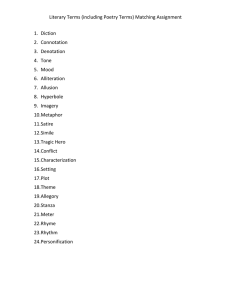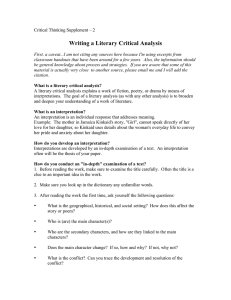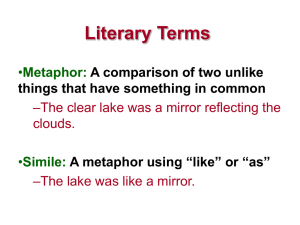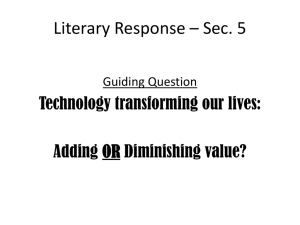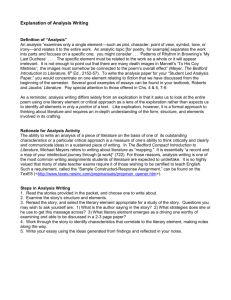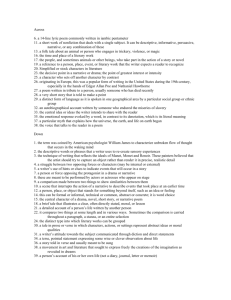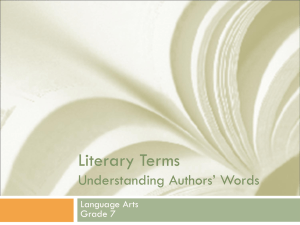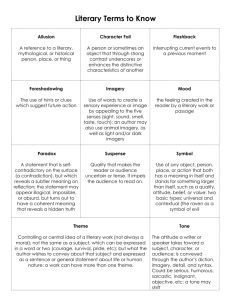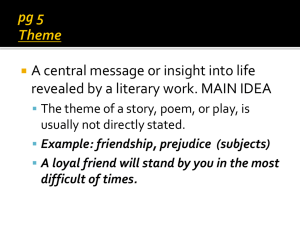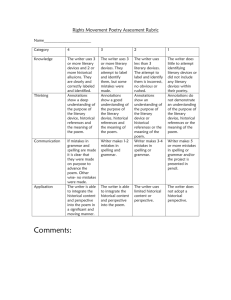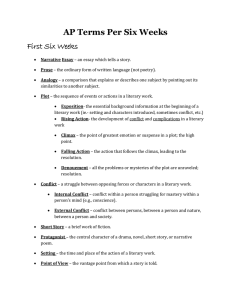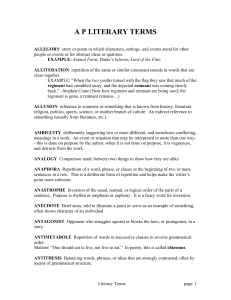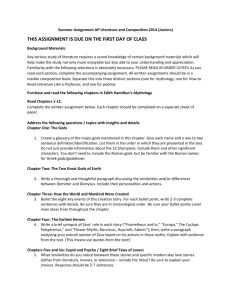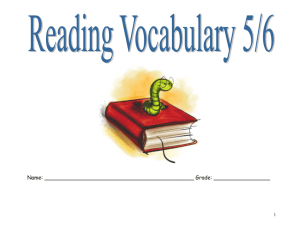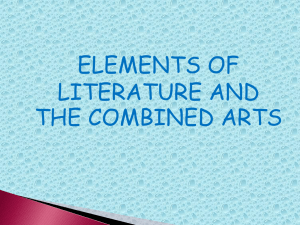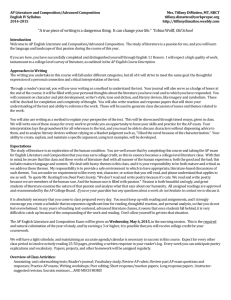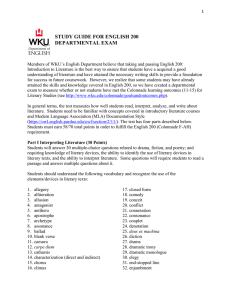Cumulative list of literary terms for Middle School
advertisement
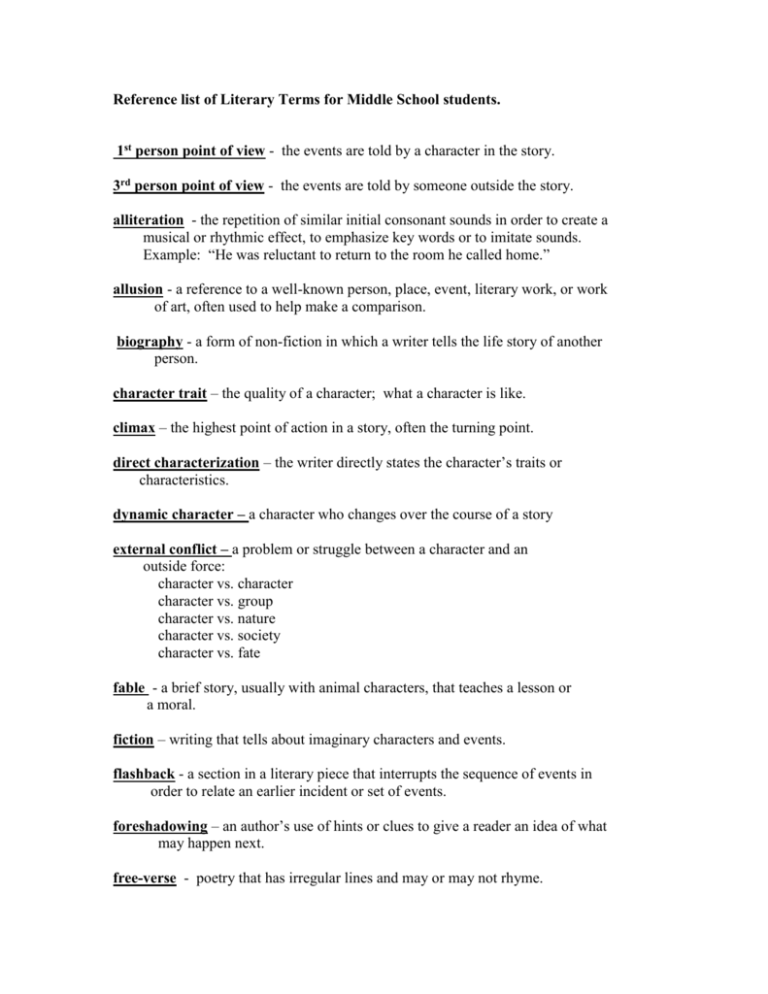
Reference list of Literary Terms for Middle School students. 1st person point of view - the events are told by a character in the story. 3rd person point of view - the events are told by someone outside the story. alliteration - the repetition of similar initial consonant sounds in order to create a musical or rhythmic effect, to emphasize key words or to imitate sounds. Example: “He was reluctant to return to the room he called home.” allusion - a reference to a well-known person, place, event, literary work, or work of art, often used to help make a comparison. biography - a form of non-fiction in which a writer tells the life story of another person. character trait – the quality of a character; what a character is like. climax – the highest point of action in a story, often the turning point. direct characterization – the writer directly states the character’s traits or characteristics. dynamic character – a character who changes over the course of a story external conflict – a problem or struggle between a character and an outside force: character vs. character character vs. group character vs. nature character vs. society character vs. fate fable - a brief story, usually with animal characters, that teaches a lesson or a moral. fiction – writing that tells about imaginary characters and events. flashback - a section in a literary piece that interrupts the sequence of events in order to relate an earlier incident or set of events. foreshadowing – an author’s use of hints or clues to give a reader an idea of what may happen next. free-verse - poetry that has irregular lines and may or may not rhyme. generalization – a vague or indefinite statement that is made to cover many cases. Example: “All human beings hope for something.” hyperbole – use of extreme exaggeration. idiom - a word or phrase which means something different from what it says – it is usually a metaphor. An idiom is an expression peculiar to a certain group of people and/or used only under certain circumstances. imagery – words or phrases that appeal to one or more of the five senses and help to create a vivid description for the reader. indirect characterization – the writer allows the reader to draw his/her conclusions as to what a character is like, based on the appearances, words, actions, and interactions with other characters. inference – a conclusion drawn by the reader based on available information. internal conflict – a problem within a character (character vs. self). irony - a situation where the opposite of what is expected to occur or exist does occur or exist. metaphor - a figure of speech in which something is described as if it were something else; a comparison made without using “like” or “as”. mood – the atmosphere or feeling an author creates within the piece of writing. moral – a lesson taught by a literary work. motivation – a reason that explains or partially explains a character’s thoughts, feelings, actions, or speech. narrative – writing or speech that tells a story. narrator – the speaker or character who is telling the story. non-fiction - writing that tells about real people, places, objects, or events. objective details – details that are factual and true to life. oxymoron – the close placement of words having opposite or near opposite meanings in order to create a unique description. parable – a short tale that illustrates a universal truth, a belief that appeals to all people of all civilizations. personification – a type of figurative language in which a non-human subject is given human characteristics. plot – the sequence of events in a literary work. point of view – the perspective from which a story is told. pun – a humorous play on words. repetition – the repeated use of words or phrases in order to emphasize a point. resolution – the events that occur in the falling action of a story’s plot. setting – the time and location of the events described in a literary work. simile – a comparison between two things, using “like” or “as”. speaker – the imaginary voice assumed by the writer of a poem, the one describing the events in a poem. stanza – a group of lines in a poem. static character – a character who does not undergo a change over the course of a story subjective details – details that reveal the author’s feelings, attitudes, or judgments. symbol /symbolism – anything that stands for or represents something else. theme – a central message, idea, or concern that expressed in a literary work. tone – the attitude of an author toward the subject that he/she is writing about. character - refers to what someone is like – what their qualities are (Someone’s character refers to their character traits.) narrative poetry - poetry that tells a story subject - what the story or poem is about (the topic)

